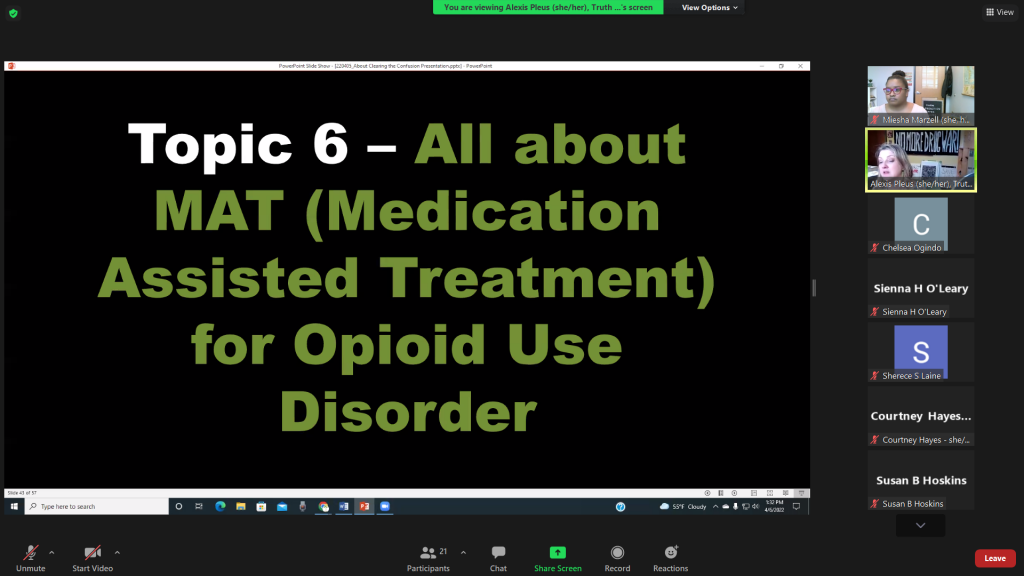Graduate students at Binghamton University partnered with various health care groups during National Public Health Week to spread awareness about harm reduction and opioid addiction.
Harm reduction is an approach to patient care meant to reduce the negative consequences of drug use by meeting patients “where they are” in relation to their substance abuse. The Master of Public Health Graduate Student Organization (GSO), in partnership with Real Education About College Health (REACH), the Addiction Center of Broome County, Truth Pharm and Decker College of Nursing and Health Sciences, hosted a series of harm reduction symposiums in an effort to provide more information and resources regarding harm reduction strategies to BU students.
The symposiums were held in honor of National Public Health Week, which takes place in the first full week of April in an effort to recognize contributions in public health. Three symposiums were held on Monday, Tuesday and Wednesday, in which a representative from the partnered organizations gave presentations about harm reduction. The floor was then opened to students to ask questions and provide thoughts on what was discussed.
Chelsea Ogindo, president of the Master of Public Health GSO, an attendee and graduate student in the Master of Public Health program, wrote that the organization felt holding the symposiums during National Public Health Week would be appropriate because harm reduction places an emphasis on community education and partnership.
“With this event, we are hoping to educate the Binghamton community on the importance of harm reduction as an approach to reducing harm associated with addiction, as well as bringing public health awareness,” Ogindo wrote in an email. “We hope that this event can assist in removing the stigma associated with substance use disorders.”
Dr. Justine Waldman, a presenter at the Monday symposium and chief executive officer (CEO) of REACH Medical, said equity in health care needs to be improved. According to Waldman, data being used regarding people of color and Indigenous populations when developing health care strategies for addiction is often inaccurate. Waldman suggested harm reduction as the most evidence-based practice that can be used for opiate use disorder.
“I think a more data-centric approach that really works on looking at health equity, issues of disparity, all those sorts of things would do a tremendous amount for medicine,” Waldman said. “I think we would be spending much less money if we had that approach, also.”
Waldman’s organization, REACH Medical, aims to help those who have faced adversity in health care environments regardless of their financial status. The organization currently offers services for opioid use disorder, primary and acute care, human immunodeficiency virus or HIV and hepatitis C treatment and more.
Miesha Marzell, associate professor of public health in Decker College and faculty adviser to the Master of Public Health GSO, said she was happy to bring more awareness to the field of public health.
“Harm reduction saves lives, period,” Marzell wrote in an email. “It has been around for decades and for the addiction community it is an approach that is needed.”
Alaina Brown, a sophomore majoring in integrative neuroscience, felt that opioid usage in Broome County is a serious issue that needs to be addressed. Brown said she feels these health concerns can be especially prevalent in smaller towns and communities.
“I’m happy that the Master of Public Health [GSO] is trying to spread more information regarding strategies to handle the opioid addiction in Broome County,” Brown said. “Intervention strategies are very important for those who are struggling with an opioid addiction or have a loved one struggling with an opioid addiction.”
Susan Hoskins, a graduate student in the Master of Public Health program, said she attended the event because of all the work her peers and professors had put into its planning. Hoskins felt the symposium had a lot of pertinent information related to the ongoing addiction crisis.
“With the growing drug use and abuse in Broome County, it is crucial to understand the background and what we can do to help keep the community safe,” Hoskins wrote in an email. “With that said, I plan to use this knowledge to shape my future career in public health.”



